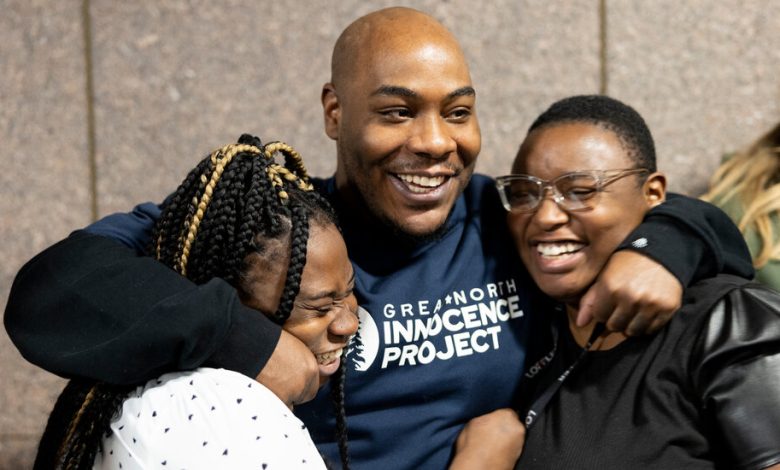Minneapolis Man Is Freed After Serving 19 Years on Murder Charge

Moments after a Minneapolis jury found Marvin Haynes guilty of the May 2004 killing of a flower shop clerk, he cried out in protest.
“I didn’t kill that man!” Mr. Haynes, who was a teenager at the time, yelled as he faced the jury. “They’re all going to burn in hell for that.”
Mr. Haynes, who was sentenced in 2005 to life in prison, has maintained that he was wrongfully convicted after a deeply flawed investigation by the Minneapolis Police Department.
His lawyers have argued that detectives threatened witnesses to pressure them to implicate Mr. Haynes in the killing, overlooked exculpatory evidence and acted improperly when they showed the sole witness an array of suspects.
On Monday, the prosecutor’s office that tried Mr. Haynes did something unusual: It asked a judge to toss out his conviction after concluding that Mr. Haynes did not receive a fair trial and the killer most likely remained at large.
“There was a terrible injustice done in this case,” Mary Moriarty, the Hennepin County attorney, said in an interview. “We can’t give Mr. Haynes back these past 19 years in prison, but we can do our best to make it right for him today.”
On Monday morning, prosecutors and Mr. Haynes’s defense lawyers jointly submitted a petition asking William H. Koch, a Hennepin County district judge, to vacate the conviction. Judge Koch agreed, setting Mr. Haynes free.
The New York Times obtained a copy of the court filing before a news conference to announce the decision, which is scheduled to take place on Monday afternoon.
Mr. Haynes, 36, was set free days before he was set to appear in court as part of a bid to secure a new trial based on new information about the police investigation.
“I always knew I was going to find a way to get justice,” Mr. Haynes said in a phone interview from prison early Monday shortly before being released. “I knew God was going to lead me through this.”
Mr. Haynes’s release comes as the Minneapolis Police Department is embarking on an era of sweeping court-enforced changes after a pair of damning reports by state civil rights investigators and by the Justice Department.
The investigations began after the May 2020 killing of George Floyd by a Minneapolis police officer. They found that the Police Department unlawfully discriminated against Black people for years and committed a torrent of abuses that went unpunished because of systemic deficiencies in training and accountability.
When Mr. Haynes, who is Black, was tried, the top prosecutor in Hennepin County was Amy Klobuchar, a Democrat, who is now the state’s senior senator. In early 2020, when she was running for president, Ms. Klobuchar faced questions about another flawed homicide investigation from that era after a report by The Associated Press. The defendant in that case, Myon Burrell, was released in December 2020 after the Minnesota Board of Pardons commuted his life sentence.
Ms. Moriarty said prosecutors seldom vacated a murder conviction while a judge was considering a petition for a new trial. But after a thorough review of the police investigation, the trial transcript and new evidence, Ms. Moriarty, a former public defender, said she concluded that setting Mr. Haynes free was the right thing to do.
Mr. Haynes was charged with murder soon after a gunman walked into Jerry’s Flower Shop in Minneapolis on May 16, 2004, and demanded cash from the two employees inside, siblings Randy Sherer and Cynthia McDermid. The gunman killed Mr. Sherer, 55, as Ms. McDermid fled the store.
Ms. McDermid told police the gunman was a Black male with cropped hair who appeared to be between 19 and 22 years old and weighed around 180 pounds. At the time, Mr. Haynes was 16, had a long Afro and weighed around 130 pounds.
After detectives showed Ms. McDermid a photo lineup of suspects that excluded Mr. Haynes, she selected one and said she was 75 to 80 percent certain he was the killer. The man in the photo, however, had a solid alibi.
After being shown a second photo lineup, she identified Mr. Haynes as the suspect. But there was a major problem: The photo of Mr. Haynes the police provided was two years old and showed him with cropped hair.
The police presented no physical evidence linking Mr. Haynes to the crime.
The case against Mr. Haynes was bolstered by two other witnesses. One was Ravi Seeley, a 14-year-old who told detectives he was near the flower shop when he heard gunshots and saw someone fleeing the scene. The teenager identified Mr. Haynes in a lineup of suspects.
The second witness was Isiah Harper, a cousin of Mr. Haynes, who was 14 at the time. The cousin told detectives he heard Mr. Haynes bragging about having committed a robbery the morning of the killing.
In 2022, the lawyers with the Great North Innocence Project, which represents people who assert they were wrongfully convicted, obtained affidavits from Mr. Seeley and Mr. Harper that called into question the integrity of the police investigation.
Mr. Seeley said in a sworn affidavit that he had not gotten a clear view of the person fleeing the flower shop and that “police officers pressured me into making potentially inaccurate identifications and telling the officers what I believed they wanted to hear.”
Mr. Harper’s sworn declaration said that he initially told detectives he knew nothing about the killing. But Mr. Harper said he later implicated his cousin after the police “threatened me with criminal charges if I did not cooperate.”
During the trial, Mr. Harper said he tried to recant the accusation on the witness stand, but relented after prosecutors warned he could go to prison. “It was all lies that I believed I had to give the police to avoid going to prison myself,” he wrote in the 2022 affidavit.
Ms. Moriarty said that detectives violated their policy on suspect lineups by showing witnesses a photo of Mr. Haynes that did not reflect what he looked like when the crime occurred. While suspect lineups are supposed to be handled by officers who are not directly involved in the investigation to ensure impartiality, detectives involved in the case conducted some of the lineups, making them “unnecessarily suggestive,” according to the court filing.
Marvina Haynes, one of Mr. Haynes’s sisters, spent years fighting for his freedom. The effort to overturn the conviction wiped out the family’s savings and has been a source of torment for nearly two decades, she said in an interview.
“These types of things don’t only affect a family, they affect a community,” she said. “When a person is wrongfully convicted, it means a killer is still on the loose.”





